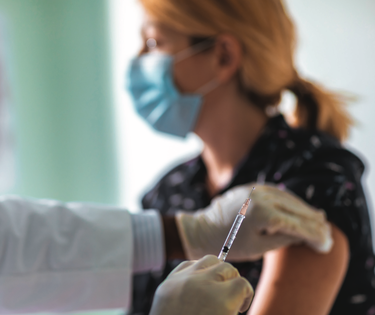NYS pauses J&J vaccination, following federal lead
ALBANY COUNTY — Doses of Pfizer vaccine that had been allotted to Albany County were given to the University at Albany on Tuesday after the state, following the lead of the federal government, put a pause on administering Johnson & Johnson vaccine.
“UAlbany has been a strong partner throughout the pandemic and it’s critical that we continue to vaccinate this age group that is far more likely to contract the virus and spread it,” said the county’s executive, Daniel McCoy, in a statement.
On Tuesday morning, the Centers for Disease Control and Prevention and the Food and Drug Administration issued a statement recommending the pause.
Howard Zucker, New York’s health commissioner, put out a statement at 8:55 a.m., saying the state would follow the CDC and FDA recommendation “while these health and safety agencies evaluate next steps.”
He went on, “All appointments for Johnson & Johnson vaccines today at New York State mass vaccination sites will be honored with the Pfizer vaccine.
“As the CDC and FDA have said, any adverse events related to the Johnson & Johnson vaccine ‘appear to be extremely rare’ and, ‘People who have received the J&J vaccine who develop severe headache, abdominal pain, leg pain, or shortness of breath within three weeks after vaccination should contact their health care provider.’”
The Food and Drug Administration gave emergency use authorization to Johnson & Johnson late in February — after first Pfizer and then Moderna were approved. More recently, manufacturing errors at a Baltimore plant with Johnson & Johnson had contracted caused delays.
The unusual clots — appearing six to 13 days after a shot — occurred in veins that drain blood from the brain and occurred together with low platelets. All six cases — each still under investigation — were in women between the ages of 18 and 48 and resulted in one death.
The clotting disorder looks to be similar to the disorder that European authorities have said is possibly linked to AstraZeneca, a COVID-19 vaccine not yet cleared in the United States.
Both of those vaccines use a cold virus to carry the coronavirus spike gene into the vaccinated person. On the other hand, Pfizer and Moderna vaccines use messenger RNA, training the body to recognize the spike protein on the surface of the coronavirus.
"We’re recommending this pause while we work together to fully understand these events and also, so we can get information out to health-care providers and vaccine recipients,” said FDA Acting Commissioner Janet Woodcock at a Tuesday press conference. “Right now, I’d like to stress these events appear to be extremely rare.”
“Together, the CDC and the FDA are reviewing data involving six reports of a rare type of blood clot called cerebral venous sinus thrombosis or CBST in combination with low levels of platelets in the blood called thrombocytopenia in women ages 18 to 48 who presented with symptoms between six and 13 days after receiving the Johnson and Johnson or Janssen COVID-19 vaccine,” said Peter Marks at the same press briefing. Marks is the director of the Center for Biologics Evaluation and Research within the Food and Drug Administration.
“Treatment of this specific type of blood clot is different from typical treatments for other types of blood clots, which usually involve an anticoagulant called heparin,” Marks went on. “With cerebral venous sinus thrombosis, heparin may be dangerous and alternative treatments need to be given preferably under the guidance of physicians experienced in the treatment of blood clots. Of the clots seen in the United States, one case was fatal and one patient is in critical condition.”
Ann Schuchat, the CDC’s principal deputy director, said she knew the information would be “very concerning to Americans who have already received the Johnson and Johnson or Janssen vaccine.”
She went on, “For people who recently got the vaccine within the last couple of weeks, they should be aware to look for any symptoms. If you’ve received the vaccine and develop severe headache, abdominal pain, leg pain, or shortness of breath, you should contact your health-care provider and seek medical treatment.
“Now, these symptoms are different from mild flu-like symptoms, fever, and so forth that many people experience in the couple of days after receipt of the vaccine,” Schuchat noted.
She also said that clotting and low platelet counts had not been seen with the other two vaccines being administered in the United States: Pfizer-BioNTech and Moderna.
At an event in Orange County on Tuesday publicizing vaccination for farm workers, Governor Andrew Cuomo said, “Johnson & Johnson is a vaccine I took. It has significant benefits because it's one shot.”
He noted that New York State would use Pfizer and Moderna during the pause on Johnson & Johnson.
Cuomo went on, “The situation with Johnson & Johnson is they had six people in the country out of 6.8 million who received the vaccine, so it's roughly one person per million. All six happened to be women. They had blood clots which are serious and they had serious headaches.”
“The reason they paused the Johnson & Johnson is they want to make sure all health-care providers know if a person comes in with these symptoms the normal medication is heparin that they give for a blood clot. That does not work in this situation, so they want to get the word out to all health care providers ….”



